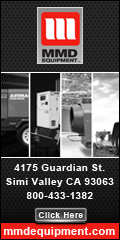
| April 2015 | Past Issues/Subscribe | Printer-Friendly | Advertise |
UPCOMING EVENTS
April 22, 2015
CRA and ARA of CA Joint Meeting hosted by American Rentals, Long Beach, Calif. More... July 19-26, 2015
RV Summer Campout, Oceano, Calif. More... August 28, 2015 First Annual CRA Golf Tournament, Corona, Calif. More... November 2-4, 2015
NW Rental Conference, Seattle, Wash. More... .jpg) January 26-28, 2016 CRA Rental Rally, Las Vegas, Nevada More... See CRA's Calendar page for more information on our upcoming events. VENDOR NEWS
 International construction equipment manufacturer Chicago Pneumatic has unveiled its new range of mobile diesel-powered generators for the European market. The rugged and easy-to-move CPDG range provides reliable and consistent power to any construction site, with five models available in 9, 14, 20, 30 and 40 kVA ratings. Suitable for prime power applications in the general construction and rental industry the generators are fully CE compliant for use in Europe. International construction equipment manufacturer Chicago Pneumatic has unveiled its new range of mobile diesel-powered generators for the European market. The rugged and easy-to-move CPDG range provides reliable and consistent power to any construction site, with five models available in 9, 14, 20, 30 and 40 kVA ratings. Suitable for prime power applications in the general construction and rental industry the generators are fully CE compliant for use in Europe.
Learn More...  IronPlanet, an online marketplace for buying and selling used heavy equipment and trucks, and Associated Auction Services LLC, an alliance of Caterpillar and several of its independent Cat dealers, that operates under the name of Cat Auction Services, confirmed Dec. 19, that they have signed an agreement to merge the two companies. Once combined, IronPlanet and Cat Auction Services will provide buyers and sellers of used heavy construction equipment a unique auction experience, backed by technology, services and equipment expertise unmatched in the industry. IronPlanet, an online marketplace for buying and selling used heavy equipment and trucks, and Associated Auction Services LLC, an alliance of Caterpillar and several of its independent Cat dealers, that operates under the name of Cat Auction Services, confirmed Dec. 19, that they have signed an agreement to merge the two companies. Once combined, IronPlanet and Cat Auction Services will provide buyers and sellers of used heavy construction equipment a unique auction experience, backed by technology, services and equipment expertise unmatched in the industry.
Learn More...  After 35 years in business, owner Craig Wilson sold Wilson Rental Center to Sunbelt Rentals. Fred Hageman, principal of Rental Acquisitions LLC, facilitated the transaction and represented Wilson Rental Center Inc. Based in Cameron Park, Calif., Rental Acquisitions has specialized in mergers and acquisitions in the equipment and special event industry for 17 years. After 35 years in business, owner Craig Wilson sold Wilson Rental Center to Sunbelt Rentals. Fred Hageman, principal of Rental Acquisitions LLC, facilitated the transaction and represented Wilson Rental Center Inc. Based in Cameron Park, Calif., Rental Acquisitions has specialized in mergers and acquisitions in the equipment and special event industry for 17 years.
Learn More...  Hilti Equidist technology for diamond core bits and wall saw blades features precisely positioned, evenly-spaced diamonds for a high-performance segment matrix. This provides the best cutting characteristics under difficult conditions, especially in concrete with high steel content. Both the HCS and HCL core bits are designed for coring in the 1 3/8"-24" diameter range in reinforced concrete. With pre-sharpened segments for easy, accurate hole starting and a high performance over the entire life of the core bit, users can see the superior performance provided by these bits. The new diamond core bits come in two specifications: HCS (High-horsepower Concrete Speed) and HCL (High-horsepower Concrete Life) built specifically for high horsepower motors (Core rig DD 200 or larger). Hilti Equidist technology for diamond core bits and wall saw blades features precisely positioned, evenly-spaced diamonds for a high-performance segment matrix. This provides the best cutting characteristics under difficult conditions, especially in concrete with high steel content. Both the HCS and HCL core bits are designed for coring in the 1 3/8"-24" diameter range in reinforced concrete. With pre-sharpened segments for easy, accurate hole starting and a high performance over the entire life of the core bit, users can see the superior performance provided by these bits. The new diamond core bits come in two specifications: HCS (High-horsepower Concrete Speed) and HCL (High-horsepower Concrete Life) built specifically for high horsepower motors (Core rig DD 200 or larger).
Learn More...  The Ditch Witch organization recently announced the release of the MV800, a low-cost, compact and durable vacuum excavator designed specifically for cleanup on horizontal directional drilling (HDD) jobsites. Featuring the heavy-duty, field-proven components that keep all Ditch Witch vacuum excavators performing strong year after year, the MV800 is built for the punishing conditions common to HDD jobsites. A commercial-grade, 31-hp (23.1-kW) Briggs & Stratton® Vanguard™ gas engine powers the MV800 and features an electric start and a high-capacity, remote air-intake filter that helps maximize performance. The Ditch Witch organization recently announced the release of the MV800, a low-cost, compact and durable vacuum excavator designed specifically for cleanup on horizontal directional drilling (HDD) jobsites. Featuring the heavy-duty, field-proven components that keep all Ditch Witch vacuum excavators performing strong year after year, the MV800 is built for the punishing conditions common to HDD jobsites. A commercial-grade, 31-hp (23.1-kW) Briggs & Stratton® Vanguard™ gas engine powers the MV800 and features an electric start and a high-capacity, remote air-intake filter that helps maximize performance.
Learn More...  The Toro Company continues to expand its masonry product offering by adding a new family of mortar mixers — the UltraMix™ line. The new models in the lineup are built for a variety of applications and are available with batch capacities ranging from light to heavy duty. The UltraMix lineup delivers the ultimate in mixing performance, thanks to an exclusive symmetrical drum and patented paddle configuration. The unique design boasts more paddle and drum contact with the mortar, and the Toro-exclusive paddle design moves mix horizontally, as well as in the circular motion. This ultimately maximizes productivity for busy masonry contractors by providing an ideal mixture while reducing mixing time. The Toro Company continues to expand its masonry product offering by adding a new family of mortar mixers — the UltraMix™ line. The new models in the lineup are built for a variety of applications and are available with batch capacities ranging from light to heavy duty. The UltraMix lineup delivers the ultimate in mixing performance, thanks to an exclusive symmetrical drum and patented paddle configuration. The unique design boasts more paddle and drum contact with the mortar, and the Toro-exclusive paddle design moves mix horizontally, as well as in the circular motion. This ultimately maximizes productivity for busy masonry contractors by providing an ideal mixture while reducing mixing time.
Learn More...  In conjunction with National Ag Day, Kubota Tractor Corporation recently announced the launch of "Geared To Give," a new program in partnership with the Farmer Veteran Coalition (FVC) that will provide financial support and donated Kubota equipment to U.S. military veterans pursuing a future in farming. Kubota and FVC jointly launched their partnership today at the California State Capitol in Sacramento during the Department of Food and Agriculture’s Ag Day festivities. In conjunction with National Ag Day, Kubota Tractor Corporation recently announced the launch of "Geared To Give," a new program in partnership with the Farmer Veteran Coalition (FVC) that will provide financial support and donated Kubota equipment to U.S. military veterans pursuing a future in farming. Kubota and FVC jointly launched their partnership today at the California State Capitol in Sacramento during the Department of Food and Agriculture’s Ag Day festivities.
Learn More...  Compact construction machines are characterized by a great deal of flexibility and versatile application areas. The smallest excavator 803 by Wacker Neuson is once again significantly expanding its application range with the dual power option. In combination with the electro-hydraulic generator HPU8, it is made into an emission-free helper with a few easy steps. With the dual power option, the Wacker Neuson excavator 803 can – in addition to the standard diesel engine – be connected to the external electro-hydraulic drive unit HPU8. Due to the generator, the excavator is operated electrically and completely emission-free. Contractors owning the 803 dual power have a machine that offers the features of a conventional diesel excavator, but at the same time, if necessary, also replaces special equipment for emission-free applications. This saves costs, ensures a higher machine utilization and expands the application areas of the mini-excavator. Compact construction machines are characterized by a great deal of flexibility and versatile application areas. The smallest excavator 803 by Wacker Neuson is once again significantly expanding its application range with the dual power option. In combination with the electro-hydraulic generator HPU8, it is made into an emission-free helper with a few easy steps. With the dual power option, the Wacker Neuson excavator 803 can – in addition to the standard diesel engine – be connected to the external electro-hydraulic drive unit HPU8. Due to the generator, the excavator is operated electrically and completely emission-free. Contractors owning the 803 dual power have a machine that offers the features of a conventional diesel excavator, but at the same time, if necessary, also replaces special equipment for emission-free applications. This saves costs, ensures a higher machine utilization and expands the application areas of the mini-excavator.
Learn More...  Doosan Portable Power has expanded its Tier 4 Final air compressor lineup with the introduction of the XHP1170WCU. The industry's first Tier 4 Final/Stage III B-compliant high-pressure air compressor, the XHP1170 will not only meet the tough demands of drilling operations, but exceed them. The XHP1170 is the first in the industry-leading Doosan air compressor lineup to be equipped with the Doosan HR350 airend. Designed and manufactured at the company's facility in Statesville, N.C., the HR350 airend offers a highly efficient rotor profile that requires less horsepower to deliver high volume cfm output, resulting in a 9 percent increase in fuel economy over the previous interim model. Doosan Portable Power has expanded its Tier 4 Final air compressor lineup with the introduction of the XHP1170WCU. The industry's first Tier 4 Final/Stage III B-compliant high-pressure air compressor, the XHP1170 will not only meet the tough demands of drilling operations, but exceed them. The XHP1170 is the first in the industry-leading Doosan air compressor lineup to be equipped with the Doosan HR350 airend. Designed and manufactured at the company's facility in Statesville, N.C., the HR350 airend offers a highly efficient rotor profile that requires less horsepower to deliver high volume cfm output, resulting in a 9 percent increase in fuel economy over the previous interim model.
Learn More... BUSINESS NEWS
Last week, as the early April survey found no snow at a key Sierra location for the first time in 75 years, the Governor called for mandatory water reductions in cities and towns across the state, along with stepped up enforcement of water use restrictions and actions to streamline the state's drought response. The Governor acknowledged that agricultural water users "have borne much of the brunt of the drought to date, with hundreds of thousands of fallowed acres, significantly reduced water allocations and thousands of farmworkers laid off."
Learn More... An April 10 article by Senator Bob Huff, the Senate Republican leader who represents the 29th Senate District covering portions of Los Angeles, Orange and San Bernardino Counties, commented on the legislation that was formally introduced by Senate Republicans last week. According to Huff, this legislation "guarantees the transportation tax dollars we all pay are directed to California's roads, highways and bridges. Senate Constitutional Amendment (SCA) 7 closes a loophole in California's Constitutional protections that has led to a diversion of transportation taxes and fees that takes money away from transportation infrastructure projects."
Learn More... Tom Scott, Executive Director, California Citizens Against Lawsuit Abuse, commented on AB 588, proposed by Assemblywoman Shannon Grove, which would give businesses a chance to correct a paycheck error within 33 days before getting hit with a lawsuit. Currently, the law does not give businesses a chance to fix insignificant mistakes on their paychecks before getting hit with such penalties. Scott stated that "California needs to make major progress when it comes to preventing abusive lawsuits. The state earned the title of "Judicial Hellhole" again this year, calling attention to the fact that California's legal climate is out of balance, and things are getting worse each year."
Learn More... Allan Zaremberg, President and CEO of the California Chamber of Commerce, reported that on April 10, the California Chamber of Commerce released a preliminary list of "job killer" bills to call attention to the negative impact that 16 proposed measures would have on California's job climate and economic recovery, should they become law. Zaremburg stated, "Although we will be opposing a number of bills throughout this year, the 'job killer' list represents the worst of the worst. These proposals will unnecessarily increase costs on California employers that will likely lead to a loss of jobs. The list is preliminary. We expect to add more bills to the list in the coming weeks as legislation is amended, and we will periodically release 'job killer' watch updates as legislation changes. Please track the status of 'job killer' bills on www.cajobkillers.com or by following @CAJobKillers on Twitter."
Learn More... The U.S. Energy Information Administration (EIA) this week projected that U.S. average regular gasoline retail prices will average $2.45/gallon (gal) during the April-September 2015 period (summer 2015), down from the $3.59/gal average during summer 2014. The significant price decline reflects a large drop in Brent crude oil prices. As daily and weekly national average prices can differ significantly from monthly and seasonal averages, and because there are also significant regional differences in gasoline prices, prices in some areas could exceed the national average by $0.40/gal or more.
Learn More... CARB
The regulation requires diesel trucks and buses that operate in California to be upgraded to reduce emissions. Lighter and older, heavier trucks must be replaced starting Jan. 1, 2015. By Jan. 1, 2023, nearly all trucks and buses will need to have 2010 model year engines or equivalent. The regulation applies to nearly all privately and federally owned diesel-fueled trucks and buses and to privately and publicly owned school buses with a gross vehicle weight rating (GVWR) greater than 14,000 pounds.
What's New: The Truck and Bus Reporting System Updated for 2015 Compliance Options (Dec. 18, 2014): The Truck and Bus regulation reporting system and the Online Reporting Guide have been updated to include 2015 compliance requirements and options.
The small off-road engine (SORE) category consists of off-road, spark-ignition engines below 25 horsepower, including small utility equipment, lawn mowers and weed trimmers. This category does not include compression-ignition engines, watercraft or recreational vehicles. The following includes general information regarding small off-road engines and ARB's SORE program: Small Off-Road Engines Fact Sheet and Certification Guidelines – online access to relevant certification documents for manufacturers.
Learn More... Owners or operators of portable engines and certain other types of equipment can register their units under the Air Resources Board's (ARB) Statewide Portable Equipment Registration Program (PERP) in order to operate their equipment throughout California without having to obtain individual permits from local air districts.
Portable Diesel Engine Airborne Toxic Control Measure On Jan. 1, 2013, the Portable Engine Airborne Toxic Control Measure (ATCM) fleet emission standards went into effect. The ATCM required owners of portable engines to submit a Fleet Compliance Report to the Air Resources Board by March 1, 2013. The next Fleet Compliance Report will be due March 1, 2017. CRITICAL ENGINE REGISTRATION REQUIREMENTS June 30, 2015: This will be the last day ARB will accept initial registration applications for Interim Tier 4 engines rated 75 bhp and above. Effective July 1, 2015: For initial registration into PERP, all diesel engines must meet the Final Tier 4 certification tier level or be a Flex engine certified under the flexibility provisions of Federal 40 CFR 1039.625, or CFR 89.102, or California Code of Regulations section 2423 (d). The PERP eligibility requirements take effect six months after the federal and CARB non-road engine emission standards for engine manufacturers change. Learn More... On July 26, 2007, the Air Resources Board (ARB) adopted a regulation to reduce diesel particulate matter (PM) and oxides of nitrogen (NOx) emissions from in-use (existing), off-road, heavy-duty diesel vehicles in California.
Posted Dec. 8, 2014: Fleet Average Calculator for Small Fleets has been made available for public use. The Small Fleet Average Calculator is for small-sized off-road fleets (2,500 or less total horsepower), and covers all compliance years. The calculator is available here. Fleet owners utilizing the calculator are advised to first read the User Guide in order to familiarize themselves with the calculator. Learn More... Q: I heard that there is a new extension available that delays compliance until 2018, is this true?
A: No. However, the Board approved an option that, in specific situations, could delay compliance for up to three trucks until Jan. 1, 2017 for owners that can demonstrate they are financially unable to comply. This option is called the Economic Hardship Extension. The Economic Hardship Extension is a last resort for fleets that were out of compliance for 2014 and have exhausted all of their compliance options. Fleet owners will need to prove they are financially unable to comply with rule requirements. Learn More... The Truck and Bus Regulation will reduce diesel-exhaust emissions from privately owned and federal government diesel trucks and buses. Privately and publicly owned school buses have different requirements and do not need to be reported. This CARB site has the Truck Regulations Upload and Compliance Reporting System (TRUCRS).
The reporting period for 2015 compliance closed Jan. 31, 2015. Vehicle owners that already reported will need to update their vehicle and owner information as it changes. If you bought or sold vehicles from your fleet, installed filters or upgraded engines on any of your vehicles you must report that information within 30 days of the change. If you reported for a mileage-based extensions such as the low-mileage construction truck extension, the agricultural vehicle extension or the low-use exemption, you must report your vehicle's Jan. 1 odometer reading by Jan. 31 each year. Also, if you sell a vehicle that was using the extension, then you must report the ending odometer reading. Learn More... In December 2011, major amendments to the Off-Road Diesel Vehicle Regulation became effective. The changes to the regulation are reflected in the fact sheets, advisories and answers to frequently asked questions available on the Knowledge Center for the Off-Road Diesel Vehicle Regulation Web page. Categories of information found on this page include: Requirements in Effect Now, Enforcement and Regulatory Advisories; Free Training Seminars; and Frequently Asked Questions.
Learn More... This area of the Off-Road Mobile Sources website pertains to off-road, large spark-ignition (LSI) equipment greater than 25 horsepower, including farm, construction and industrial equipment, powered by gasoline and liquefied petroleum gas (LPG) and other alternate fuels. Typical applications that use LSI engines include forklifts, specialty vehicles, airport service vehicles, large turf-care equipment, portable generators and a wide array of other agricultural, construction and general industrial equipment. The U.S. EPA has sole authority to control new farm and construction equipment under 175 horsepower.
Learn More... The ARB's Heavy-Duty Vehicle Inspection Program and Periodic Smoke Inspection Program were adopted into law in 1988 to control excessive smoke emissions and tampering from heavy-duty diesel trucks and buses. The regulations Title 13 CCR, sections 2180-2189 for HDVIP and Title 13 CCR, sections 2190-2194 for PSIP, which govern these programs, were last amended in 2013.
The HDVIP program requires heavy-duty trucks and buses to be inspected for excessive smoke and tampering and for engine certification label compliance. Any heavy-duty vehicle traveling in California, including vehicles registered in other states and foreign countries, may be tested. Tests are performed by ARB inspection teams at border crossings, CHP weigh stations, fleet facilities and randomly selected roadside locations. Owners of trucks and buses found in violation are subject to minimum penalties starting at $300 per violation. Learn More... |

| calrental.org |



